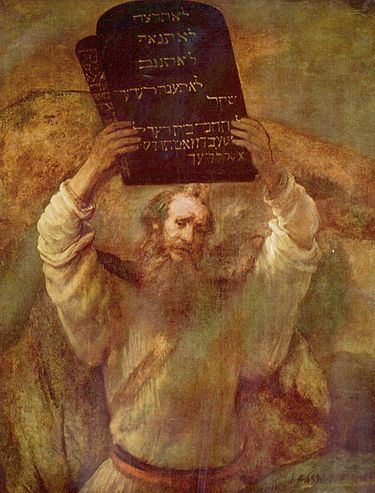The monument that’s been sitting on the grounds of the state capitol for the past three years, that is. Yesterday, by a whopping 7-2 margin, the state supreme court took just a few paragraphs to rule that the monument has got to go because it violates Article 2, Section 5 of the state constitution, which reads:
No public money or property shall ever be appropriated, applied, donated, or used, directly or indirectly, for the use, benefit, or support of any sect, church, denomination, or system of religion, or for the use, benefit, or support of any priest, preacher, minister, or other religious teacher or dignitary, or sectarian institution as such.
The monument was paid for with private funds, so it was the public property (capitol grounds) that created the problem, having been used to support the Judeo-Christian system of religion. The Ten Commandments, said the court, “are obviously religious in nature and are an integral part of the Jewish and Christian faiths.”
Article 2, Section 5 is what’s come to be known as a Blaine Amendment,” after an amendment to the U.S. Constitution introduced in 1875 by Rep. James G. Blaine (R-Maine). The amendment was intended to end political efforts to secure funding for private religious schools, most of which were Catholic — and anti-Catholicism lay behind much of its support. While it narrowly failed to win congressional approval, versions of it were subsequently incorporated into a number of state constitutions.
Among the latter was Colorado, where anti-Catholicism was in evidence when it wrote its first constitution the following year. The Colorado Supreme Court’s rejection of a county school voucher plan earlier this week dismissed the argument of voucher supporters that the provision should be ignored because of the Blaine Amendment’s bigoted origin, based on an earlier determination that “’constitutional provisions must be declared and enforced as written’ whenever their language is ‘plain’ and their meaning is ‘clear.’”
But while conservative advocacy organizations like the Becket Fund consistently use the anti-Catholicism at work in Blaine’s original amendment to delegitimize state Blaine Amendments, in many states there’s no evidence that anti-Catholicism played a role in their drafting. That’s the case in Oklahoma, which incorporated a “Blaine Amendment” into its first constitution as a federally mandated condition for statehood fully three decades after the original Blaine Amendment.
Responding with disappointment to the Oklahoma ruling yesterday, Gov. Mary Fallin and Attorney General Scott Pruitt claimed that the monument was merely intended to manifest the historical significance of the Ten Commandments. If historical significance is what they care about, perhaps they should instead celebrate Article 2, Section 5, both as a living memorial to the founding of their state and as a tribute to America’s first Baptists, who were devoted to strict church-state separation. In Oklahoma, Baptists outnumber every other religious group by orders of magnitude.






